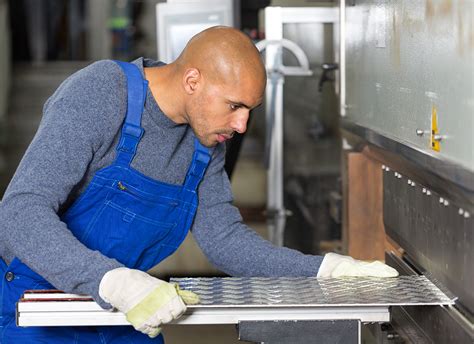Sheet metal workers are skilled craftsmen who specialize in the fabrication and installation of sheet metal products. They work with a variety of materials, including aluminum, steel, and stainless steel, to create a wide range of products, from simple gutters and downspouts to complex architectural cladding and HVAC systems.

What They Do
Sheet metal workers typically perform the following tasks:
- Read and interpret blueprints and specifications
- Cut and shape sheet metal using a variety of tools and equipment
- Weld, solder, and rivet sheet metal components together
- Install sheet metal products on buildings and other structures
- Maintain and repair sheet metal products
Where They Work
Sheet metal workers work in a variety of settings, including:
- Construction sites
- Manufacturing plants
- Repair shops
- Home improvement stores
Education and Training
Sheet metal workers typically complete a three- or four-year apprenticeship program to learn the trade. During their apprenticeship, they receive on-the-job training and instruction in a classroom setting. They must also pass a journeyman’s exam to become fully certified.
Skills and Abilities
Sheet metal workers need a variety of skills and abilities, including:
- Manual dexterity
- Good hand-eye coordination
- Strong mathematical and spatial reasoning skills
- Ability to read and interpret blueprints
- Ability to work independently and as part of a team
Job Outlook
The job outlook for sheet metal workers is expected to be good in the coming years. The Bureau of Labor Statistics projects that employment of sheet metal workers will grow by 10 percent from 2016 to 2026, faster than the average for all occupations. This growth will be driven by the increasing demand for sheet metal products in construction and manufacturing.
Salary
The median annual salary for sheet metal workers was $48,860 in May 2019, according to the Bureau of Labor Statistics. The top 10 percent of earners made more than $79,460, while the bottom 10 percent earned less than $31,340.
Benefits
Sheet metal workers typically have the following benefits:
- Medical insurance
- Dental insurance
- Vision insurance
- Paid time off
- Retirement plan
Tips and Tricks
Here are a few tips and tricks to help sheet metal workers succeed:
- Invest in high-quality tools and equipment. The better the tools you use, the better the results will be.
- Take pride in your work. Take the time to do the job right, and it will show in the finished product.
- Stay up-to-date on the latest technology. The sheet metal industry is constantly evolving, so it’s important to stay on top of the latest trends.
- Network with other sheet metal workers. Get involved with your local union or trade association. This will help you stay connected with the industry and learn from other professionals.
Common Mistakes to Avoid
Here are a few common mistakes to avoid when working as a sheet metal worker:
- Not reading the blueprints carefully. It’s important to take the time to fully understand the plans before you start working.
- Using the wrong tools or materials. Make sure you have the right tools for the job and that you are using the correct materials.
- Cutting the sheet metal too short. It’s always better to cut the sheet metal too long and then trim it down to size.
- Not taking safety precautions. Sheet metal work can be dangerous, so it’s important to wear the proper safety gear and follow all safety procedures.
FAQs
Here are a few frequently asked questions about sheet metal workers:
- What is the difference between a sheet metal worker and a roofer? A sheet metal worker fabricates and installs sheet metal products, while a roofer installs and repairs roofs.
- What is the difference between a sheet metal worker and a tinsmith? A sheet metal worker works with a variety of materials, while a tinsmith specializes in working with tin.
- What is the future of the sheet metal industry? The future of the sheet metal industry is bright. The demand for sheet metal products is expected to grow in the coming years, driven by the increasing construction and manufacturing activity.
Conclusion
Sheet metal workers are skilled craftsmen who play an important role in the construction and manufacturing industries. They are responsible for the fabrication and installation of a wide range of sheet metal products, from simple gutters and downspouts to complex architectural cladding and HVAC systems.
